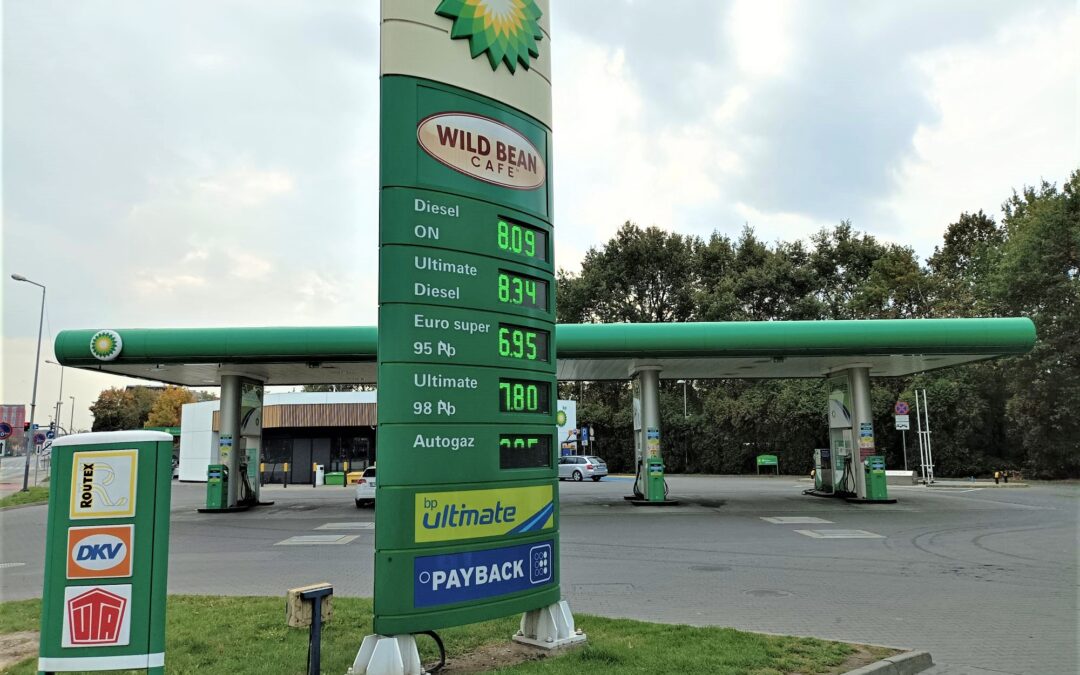The average price of diesel fuel has hit an unprecedented level in Poland. The price of 95-octane petrol is also rising sharply, with experts warning that further increases are still to come.
The national average retail price per litre of diesel is now 8.08 zloty (€1.68), according to BM Reflex, a fuel consulting website. That is the first time that the figure has passed 8 zloty.
It marks a sharp increase on last week’s 7.60 zloty and is almost 1 zloty higher than the average price just three weeks ago. The previous record came in March and June this year, when the price came close to but remained under 8 zloty.
Meanwhile, 95-octane fuel currently costs an average of 6.94 zloty per litre in Poland – a sharp increase on the 6.24 zloty from three weeks ago. However, it still remains below the record level of 7.94 zloty seen in June.
The rises have been caused by increasingly expensive crude oil and a weak zloty, as well as a seasonal increase in demand for the fraction of oil from which diesel fuel is produced, reports news website Gazeta.pl, adding that most petrol companies also ended fuel discounts at the beginning of October.
“The rises in oil prices are the market’s reaction to last Wednesday’s decision by OPEC+…to reduce production limits by 2 million barrels per day,” said Rafał Zywert, an analyst for BM Reflex.
The impact is particularly strong on diesel, the price of which in any case always rises at the beginning of the heating season. In the Silesia province – which has the highest average price in Poland at 8.14 zloty – some petrol stations are already charging motorists almost 8.50 zloty, reports news website O2.pl.
”We have entered a period of high volatility in oil and fuel prices, caused by insufficient reserves,” said Adam Czyżewski, chief economist for state oil firm PKN Orlen, quoted by the Polish Press Agency (PAP). “In order to calm the situation, a greater supply of fuel from new refineries is needed.”
“The diesel shortage is particularly profound, as additional demand for this fuel is generated by the power industry,” Czyżewski added. “Available heat and power generating facilities powered by diesel and fuel oil mitigate the energy shortage caused by the lack of natural gas.”
Rising fuel prices have also helped push inflation to a 25-year high in Poland, reaching an annual rate of 17.2% in September.
The effect on consumers would be even more severe if not for the reduced VAT rate on fuel that is part of the government’s “anti-inflation shield” – the price of a litre of diesel would be around 9.5 zloty, with a litre of 95-octane fuel costing around 8 zloty.
But experts are warning that this will not be the end of the increases. “The prognosis is not optimistic. In the coming week our forecasts are between 8.12 and 8.31 zloty [for diesel] at most stations, and for 95-octane petrol there will be another jump, with prices between 6.89 and 7.11 zloty,” Jakub Bogucki, an analyst for e-petrol.pl, told Polsat.
Petrol and diesel prices rose by more than 35% in Poland in the three months after Russia’s invasion of Ukraine, a higher rate than in any other European Union country.
However, while prices have reached record highs in Poland, they still remain lower in absolute terms than in many other EU countries (though average earnings in Poland are also lower).
Affichant les prix du carburant les plus bas d'Europe de l'Ouest (il faut aller jusqu'en Pologne pour trouver moins cher), avec toutes les remises, la France attire les frontaliers en masse, au point de voir certaines pompes être en rupture de stock !https://t.co/0SI29VeKjv pic.twitter.com/ul6TkE5EBZ
— Aymeric Pontier (@aympontier) September 6, 2022
Main image credit: Ben Koschalka

Ben Koschalka is a translator, lecturer, and senior editor at Notes from Poland. Originally from Britain, he has lived in Kraków since 2005.




















